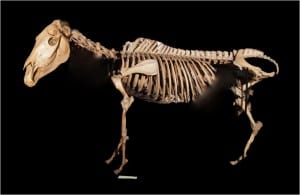Happy 130th Quagga Day – Maybe more extinct than we thought
By Jack Ashby, on 12 August 2013
130 years ago today, 12th August 1883, the last ever quagga died.
As custodians of one of the only quagga skeletons in existence, we consider it our responsibility to commemorate the tragic passing of this, the least stripy of the zebras.
Given that we have marked quagga day annually, what can I tell you that regulars wont already know? Potentially, quite a lot – things that I’ve only found out today as I write. Before I get to that, for those who don’t come pre-quagga’ed:
- Quaggas were a South African Zebra with a stripy front end and a brown back end.
- Quagga skeletons are “the rarest skeletons in the world“ [1].
- They were driven to extinction due to farmers killing them to stop them grazing the land they wanted for their livestock; and for their unusual pelts.
- The last individual died in a zoo in Amsterdam, probably years after all of her wild relatives
This is our quagga:
Isn’t she a beaut?
The Grant Museum quagga is the only such skeleton on display in the UK. I have occassionally considered making it my life’s mission to see all the quagga skeletons in the world. I normally come to the conclusion that there are nobler missions I should focus on first [2]. However, should one choose to undertake such a mission (or indeed if a TV producer agrees that Jack Ashby’s Great Quagga Quest is a winning concept), you would need to know where they all are. There is no point in travelling to the quagga’s former home. Sadly no skeletons remain in South Africa, which brings to mind the whole issue of repatriation that has never really been a feature of zoology museum politics.
Anyway, since I’ve worked at the Grant Museum, I’ve always referred to the Quagga Project‘s list of known quagga specimens, which says there are seven skeletons world-wide. I’ve used this information for years to write labels, books, websites, articles and blogs. It is the only list I’ve come across (though I personally don’t think the Project’s goal of selectively breeding not-very-stripy plains zebras to “re-create” quaggas is the best use of resources). They list the following instutions as having quaggas:
- Museum für Naturkunde, Humboldt Universität, Berlin
- Rijksmuseum van Natuurlijke Historie, Leiden, Netherlands
- British Museum (Natural History), London, England
- University College, London, England
- Peabody Museum, New Haven, USA
- Museum National d’ Histoire Naturelle, Paris, France
- Academy of Natural Sciences, Philadelphia, USA
Aside from the out-dated names of some of these collections, in researching this post I am experiencing some doubt as to its accuracy. I can find no mention of a quagga skeleton on the websites of 1, 2, 3, 6 or 7. The only ones I’ve found evidence to exist are ours and the Peabody’s. Is it possible that there are in fact even fewer than we once believed?
I confess to writing this on Sunday, and so am not in a position to get a response from my colleagues at these institutions to confirm whether or not they have specimens before this is published. Needless to say that’s what I’ll be doing now (what better a day to do it?), and will report back on what I find. If anyone has set eyes on another quagga skeleton, please comment below (don’t worry about skins – there are quite a few of them in museums).
It’s possible that these museums simply haven’t thought to mention that they have a quagga skeleton (they may not realise their rarity), but the world should prepare itself for this animal to be even more extinct than we previously realised.
Please, join me in raising a glass and remembering the passing of the last quagga 130 years ago today. Lest we forget
1. I should confess that I’m quoting myself here. Click the link to read why.
2. I had previously prioritised seeing all species of Australian quoll in the wild, but having got that under my belt I’m working on finding every egg-laying mammal in the UK. The benefit of chasing dead animals is that you don’t have to wear camouflage or get up at 4am.
Jack Ashby is the Manager of the Grant Museum of Zoology.
3 Responses to “Happy 130th Quagga Day – Maybe more extinct than we thought”
- 1
-
2
Dennis Oneil wrote on 18 January 2015:
Hi we have just discovered that we have the 24th Quagga skin!!!
Not sure what to do with it?
Dennis
New Zealand -
3
Happy 132nd Quagga Day! It’s been a good year for quaggas | UCL Museums & Collections Blog wrote on 12 August 2015:

[…] celeberation/commeration of Quagga Day has become annual fixture at the Grant Museum, as we are one of only six or seven institutions worldwide to care for a quagga […]
 Close
Close



[…] were heard on the grapevine that perhaps one of the zebras was in fact a quagga, one of the rarest skeletons in the world. Alan Gentry, a specialist examined both ‘zebra’ skeletons to measure things so minute […]